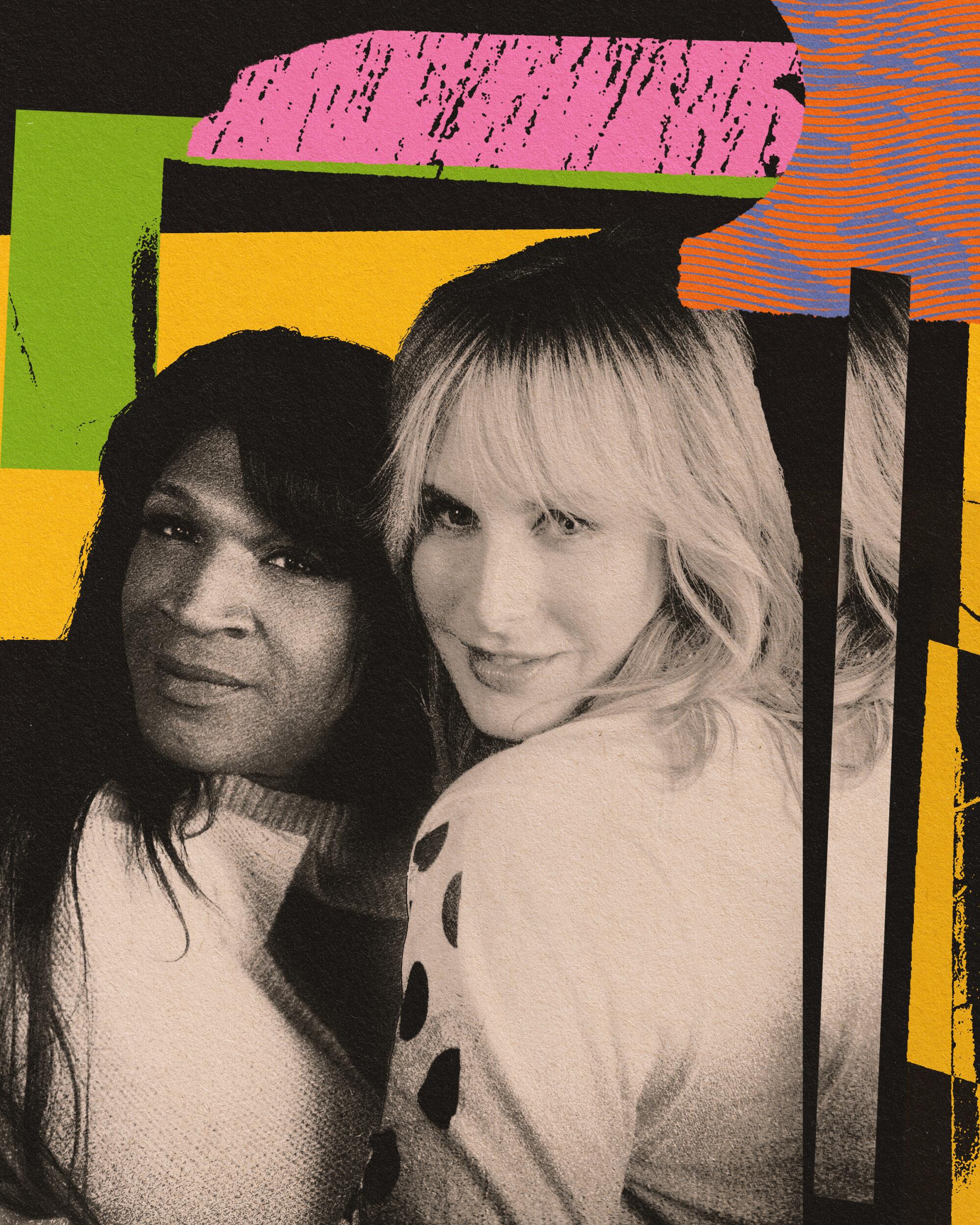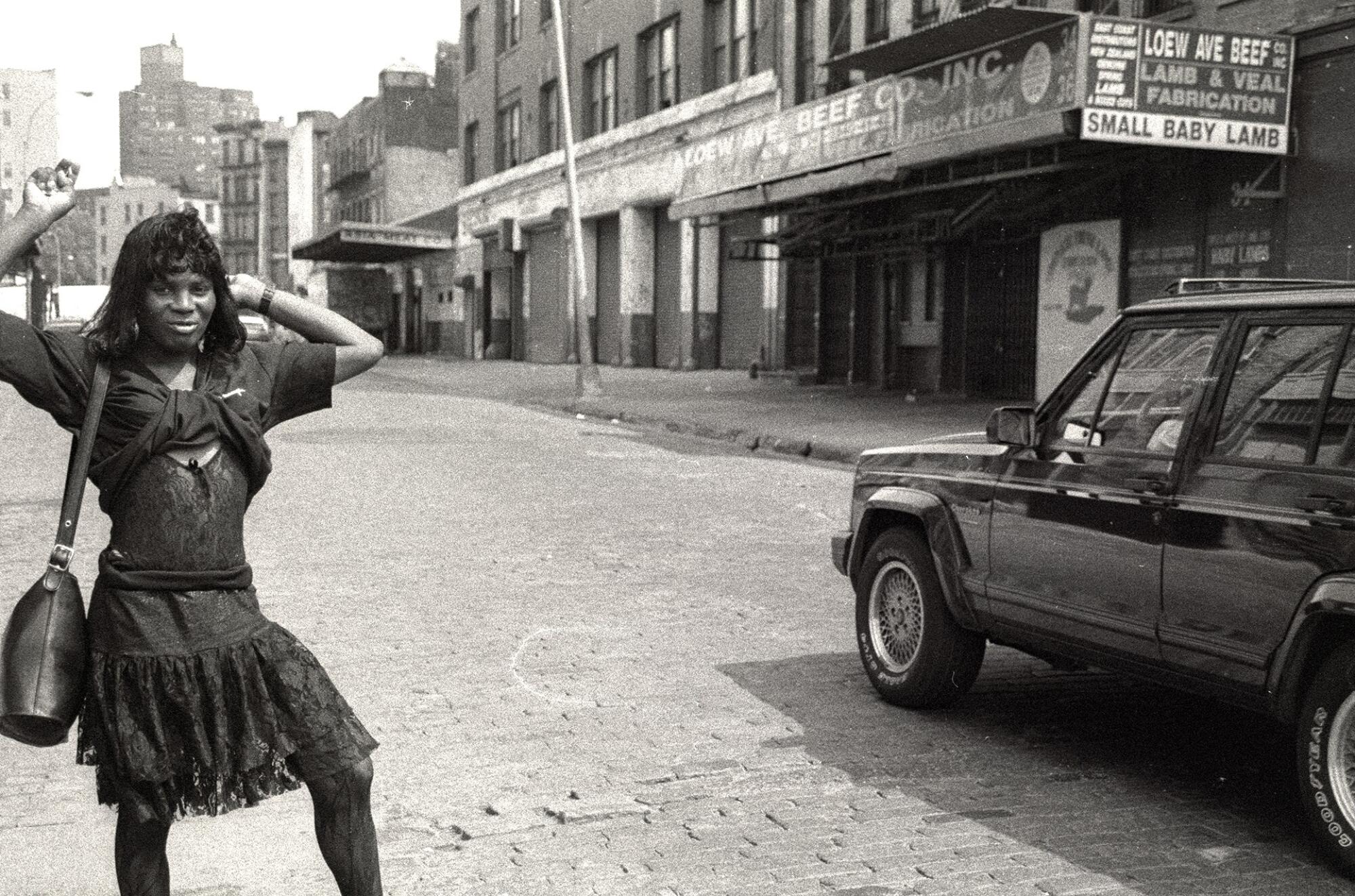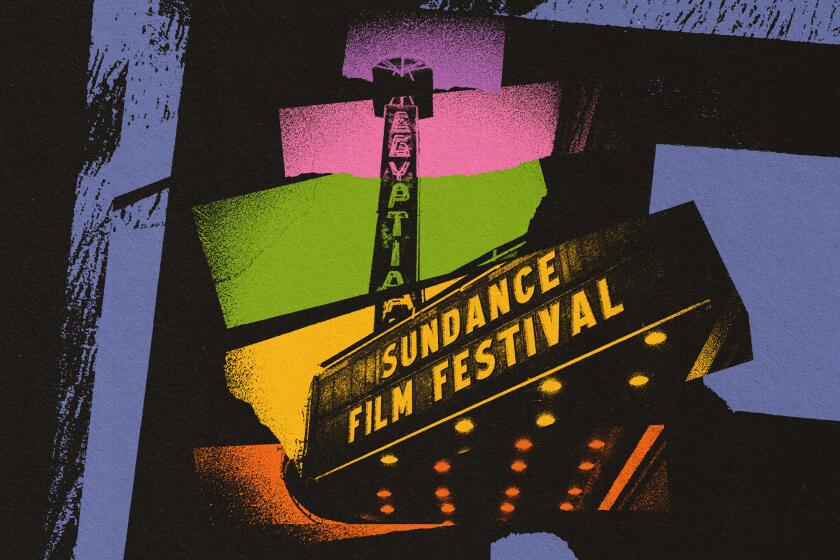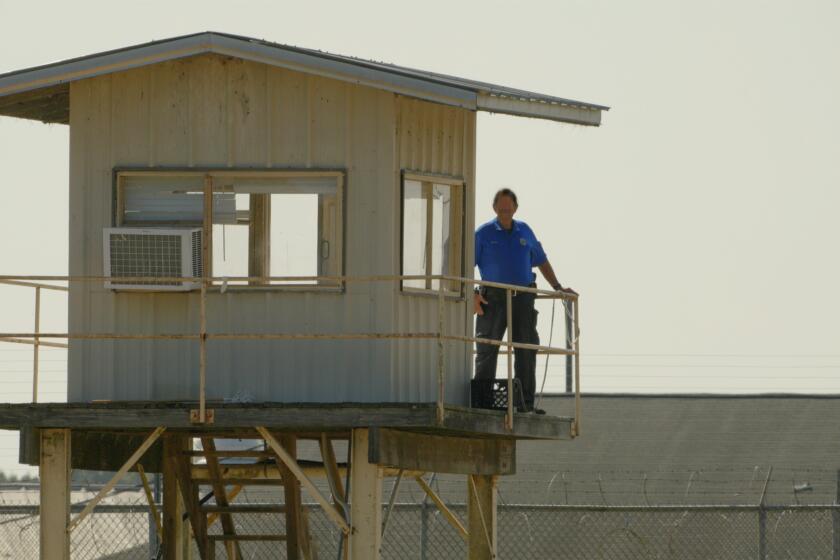- Share via

Kristen Lovell and Zackary Drucker look back at the Sundance Film Festival as a bit of a Cinderella experience. Their film, “The Stroll,” about the history of trans sex workers in New York’s Meatpacking District before its gentrification, not only premiered as part of the U.S. documentary competition, but was recognized with a Special Jury Award for Clarity of Vision.
For both directors, being accepted into the festival was already a validation of their work, so seeing how the film resonated with an audience and also win an award was just icing on the cake. The accolades were particularly meaningful to Lovell, who, after spending time working on the stroll when she was younger, had been determined to tell the story of her fellow trans sex workers for years. The experience also reaffirmed for Drucker the importance of festivals in the indie film economy.
We caught up with Drucker and Lovell shortly after “The Stroll” premiered on HBO in June. The wider release of the documentary has led to Lovell, who both narrates and appears in the film as an interviewer, to be recognized on the street and even her local pizza shop.
Longtime festival programmer John Nein reveals eight tips for applying to Sundance. Plus, seven filmmakers reveal their festival dos and don’ts.
A belated congratulations for “The Stroll’s” special jury prize at Sundance! What did that recognition mean to you?
Lovell: It just meant so much. It wasn’t just my award, it was for all the girls that slipped through the cobblestones and never got the recognition that they deserved. It’s so powerful and unexpected and I just can’t believe the response to the film and all of the love that’s being shown.
Drucker: Sundance feels like a lifetime ago but it was so validating to have our film recognized by the jury and even better to celebrate the launch of the film with Kristen and [producer] Matt [Wolf] because they both had COVID during the awards ceremony so I was accepting the award alone. I’m just so happy to just share this moment with the whole team and for this baby to be born into the world. It’s reaching far and wide and it’s always very overwhelming when something comes out. Everybody reaches out at the same time.
You already knew your film would be released on HBO so your experience post-Sundance was probably a little different than other filmmakers. But what was the interim between Sundance and the HBO launch like for you?
Lovell: It was stressful, but a good stress. I really just wanted to see what the response was going to be once the film hit the streets.
Drucker: It’s played in so many film festivals. We went to London.
Lovell: It played at Festival Munich. Some others want us to submit. I’m getting a lot of messages. I’ve just been processing because my message box has been nonstop [since the film’s HBO premiere]. I had a little break down emotionally — not a bad one, but just of joy. And finally feeling seen and heard and people thanking me for making this film and sharing it. I’m overwhelmed with emotion right now. I’m still trying to process all the feels and figure out the path forward. I’ve never experienced anything like this. It’s all very special and it’s all due to the stroll. Like, thinking that 20-something years ago, we were invisible people. We only came out at night. Now we’re being seen and our stories are being heard. So it’s very powerful and I’m still in process mode.
Can you talk a bit about your Sundance experience? Was it like a dream come true?
Lovell: It most definitely was. I’ve always had an affinity for film. Growing up, movies were my thing. I read all of the magazines and I knew what Sundance was so when we got accepted, it was just mind-blowing. And then to be there in Park City, and then winning the clarity of vision award, it just solidified my place in this world that I fought so hard to get to. It’s like the highest honor to me. It’s not even about the award — the award was getting into Sundance, the award was the ability to make the film, the award is the audience response.
Drucker: I’m just loving your ruminating on it, Kristen, it’s so wonderful to hear. I mean, it’s your story — it’s so deep and personal and now public and professional. It absolutely was a dream come true for me, too. I had only been to Sundance with “Disclosure” in 2020 as one of the subjects, so being there with a film was so legitimizing for me and I hope to stay in the family. It was just indelible as an experience. There’s something about being on the top of a mountain in a winter wonderland that’s just sealed into my memory.
Longtime festival programmer John Nein reveals eight tips for applying to Sundance. Plus, seven filmmakers reveal their festival dos and don’ts.
What do you consider the emotional high point of your Sundance experience?
Lovell: Sitting in the audience at our world premiere. Right before the credits rolled, all I could hear was sniffling and crying. At first, I didn’t believe it. And then I turned around and Matt is crying. Everybody’s in tears. It was so unbelievable to me. And then, it was the thunderous applause of the standing ovation. Twice. When we all went up onto the stage, it was the continuous standing ovation.
Drucker: I agree, the high point for me was the standing ovation and the overwhelming feelings. Because when you work on a film, you see it a thousand times. You see it over and over and over and you can’t get emotional every single time you watch it. It really makes you conscious of how situational watching a film is and how much your environment mediates your experience of it. And how special it is to watch a film in a theater filled with people. I was crying too. It was such a powerful, connected feeling. There was an interconnected experience of seeing the film after watching it on our laptops and on our TVs at home together, over and over again, for months. It just was a transformative experience in a room full of people. And watching films in theaters is crucial. I believe that it will stand the test of time. That no matter how much things change in society, watching a film in a theater will survive.
What was the most fun thing that you did in Park City outside of your film’s launch?
Lovell: I think it was when Matt dragged me out of my room while we both had COVID to go snowshoeing. As much as I complained, it did make me feel better.
What did you learn from your Sundance experience?
Lovell: I was always told that Sundance was one of the hardest festivals to get into, which is why I was in disbelief when we got in. That was the lesson there. You just never know what your work is going to bring. The dedication, the work and believing in your project and then seeing others believe in it, it definitely validated my experience as a filmmaker.
Drucker: I agree that the stamp of approval that Sundance offers to film and to a filmmaker is irreplaceable and validating, no matter what. And film festivals are essential for independent films to have platforms to find audiences and to have a shot at reaching the broadest possible audience. Being conscious of how festivals have struggled through the pandemic, my biggest learning lesson was just that festivals are essential to this ecosystem. That without the festivals, we would be unmoored in a corporate landscape.

What is your sense of the state of indie film right now?
Drucker: It seems like it’s in a real recess. ... Things have just been in flux. It seems like everybody is trying to get their bearings and calibrate change and anticipate how the changes that are happening will impact. At a higher level, I think a lot of folks have been overpaid for a long time and are afraid of losing jobs. The mode of operating has been to keep all the same people employed for so long and that with this era of higher consciousness around equity and bringing emerging talent into the industry, we’re busting down the doors and eking out a place to exist. It’s happening imperfectly, but it’s changing seismically nonetheless.
Has the labor conflict in Hollywood slowed down your momentum or affected your trajectory in the industry in any way?
Lovell: I haven’t felt the impact. I’m in SAG, but since the pandemic, it’s already been a struggle to survive. I just recently started receiving casting notices again. I’m still in pandemic mode as far as work in that realm so I don’t really notice an impact.
Drucker: I have projects that are in the scripted realm and yeah, absolutely, everything is wonky and stopped. And friends who primarily work in scripted are asking about documentary and are very curious all of a sudden. They’re such different worlds in a way. And witnessing “The Stroll” go to other festivals as well, it just made me very aware of that, like, there’s documentary festivals. There’s a whole circuit of horror festivals. The last strike, I know, was the beginning of reality television becoming what it is, so you have to wonder how things will shift because of this strike.
‘The Stroll,’ premiering Wednesday on HBO and Max, is part of a wave of recent films to reconstruct LGBTQ+ stories from unexpected sources.
Do you have any advice for people who are aspiring to get into Sundance?
Lovell: Just keep doing what you do and keep trying, if that’s your goal.
Drucker: There’s only so much room in the Sundance program and there’s so many [other] festivals, so don’t be discouraged. I’ve submitted films to Sundance forever and not gotten in. Create no matter what, knowing that an audience will find your work. There’s no end all be all, you know. There’s so many festivals and so many audiences out there waiting to receive your story.
It’s a particularly hostile time for the trans community right now. Not to imply that things were all great and people suddenly decided in the last few years to be more vocal about their hate, but how have you navigated “The Stroll” being released at a time like this?
Lovell: I’ve always been unapologetic: I don’t care about them. I know it impacts people and people that are not used to these types of attacks are scared. But that’s what they are designed for: fear. They’re lessons in terror. So we shouldn’t show that fear because that’s the response that they’re looking for. That’s what I keep telling people. I kind of knew that eventually they would attack our healthcare and our access to hormones. That with the visibility, these issues might present themselves, and they have. Trying to stop trans people, it’s the same thing that led up to Stonewall. Tennessee had that drag ban on public performances and performances in the presence of children] and it was struck down by a federal judge as unconstitutional. These people that are trying to stifle rights and take us back to I don’t know what world they want us to be living in, they’re talking about how they’re patriotic Americans. But we have the Constitution of the United States.
Drucker: “The Handmaid’s Tale” has never been more prescient. Trans rights are just on this list that is actually about overthrowing our democracy and replacing it with a far-right Christian dictatorship. And we shouldn’t mince words. This is a real threat to 250 years of law and social democracy. Fascism always creeps in in any civilization and trans people are a lightning rod that represent a modernizing world. Unfortunately, trans people do not have widespread acceptance, even on the left. I hope that people realize that being unified in their hatred of the other does not improve their lives. Their taxes are not any lower, they don’t have better jobs, their lives are not improved by hating people.
Lovell: You know, they’re looking for alien life on other planets, but can’t accept the trans people and gender non-conforming people here on Earth. What’s the point of going to space to look for life if you can’t even accept the life on the planet that you’re on?
Drucker: But things will shift in ways that we don’t expect. AI has become such a huge conversation this year. And truly, the binary of the future is humans and robots and I think we all know who’s going to survive.
How has this current environment or your experience with “The Stroll” affected your thoughts on the art you want to make and the stories you want to keep telling?
Lovell: I had an epiphany the other day. And I realized, you know, I’m thinking about stories and thinking about trans stories and stuff and it’s something I want to explore but I don’t know how to do it yet. So I was thinking about maybe trying to get into narrative work and taking a narrative lab at Sundance.
Drucker: Yas! Do it! I love that idea. I think “The Stroll” is coming into the world at the right moment. It’s a reminder to everyone that we survive. That trans folk and marginalized people find ingenious ways of surviving and we will persist no matter what the obstacles.
Lovell: That’s what we do. Our whole life is an act of revolution.
More to Read
Only good movies
Get the Indie Focus newsletter, Mark Olsen's weekly guide to the world of cinema.
You may occasionally receive promotional content from the Los Angeles Times.













